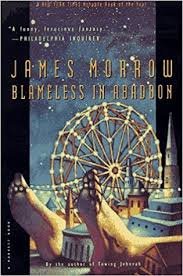
James Morrow - Blameless in Abaddon (Engelstalig)
Kenmerken
- Conditie
- Zo goed als nieuw
- Levering
- Niet van toepassing
Omschrijving
404 pagina's
In this funny, ferocious fantasy (Philadelphia Inquirer), God is a comatose, two-mile-long tourist attraction at a Florida theme park-until a conniving judge decides to put Him on trial in The Hague for crimes against humanity. A New York Times Notable Book of the Year.
This is the sequel to Towing Jehovah, a novel that garnered a World Fantasy Award and earned its author the moniker, "Christianity's Salman Rushdie." In this book, the two-mile long corpse of God (the corpus dei) has been towed to Florida, where the American Baptist Confederation has set it up as the Main Attraction at Celestial City. When Martin Candle, justice of the peace for Abaddon Township, Pennsylvania, loses his wife in a freak auto accident just after his doctor tells him he has prostate cancer, he decides it's time to put the Main Attraction on trial for His actions.
This is the sequel to Towing Jehovah, a novel that garnered a World Fantasy Award and earned its author the moniker, "Christianity's Salman Rushdie." In this book, the two-mile long corpse of God (the corpus dei) has been towed to Florida, where the American Baptist Confederation has set it up as the Main Attraction at Celestial City. When Martin Candle, justice of the peace for Abaddon Township, Pennsylvania, loses his wife in a freak auto accident just after his doctor tells him he has prostate cancer, he decides it's time to put the Main Attraction on trial for His actions.
God isn't dead after all. He's just in a coma. The angel who announced the Creator's demise in Morrow's World Fantasy Award-winning Towing Jehovah (1994) was simply wrong. God's body is no longer controlled by the Catholic Church, either. Strapped for funds, the Vatican has sold the Corpus Dei to the Baptists, who (shades of Stanley Elkin's The Living End, 1979) have turned the body into the central attraction at a religious theme park. Then a Pennsylvania justice of the peace named Martin Candle gets prostate cancer and loses his beloved wife in a freak automobile accident. Outraged, Job-like Martin decides to put God on trial before the World Court in The Hague. As in Towing Jehovah, Morrow combines black comedy with theological speculation in an often painful examination of God's possible responsibility for human suffering. There are some powerful and surreal scenes here, as when Martin, gathering information for the prosecution, enters God's brain and finds himself on a packet steamer captained by Saint Augustine, their destination the Garden of Eden. Along the way, they run into various biblical characters, many of whom applaud Martin's actions. Much of the narrative is heavy going, consisting of detailed discussions of "theodicy," the "attempt to reconcile the fact of evil with the existence of an omnipotent, omniscient, omnibenevolent Creator." Equally hard to deal with, though for emotional reasons, are the extended descriptions of human suffering, ranging from the gas chambers of Auschwitz to Martin's cancer. Ultimately, this is a dark and powerful sequel, but one lacking subtlety as well as the surprise and adventurousness of the original.












